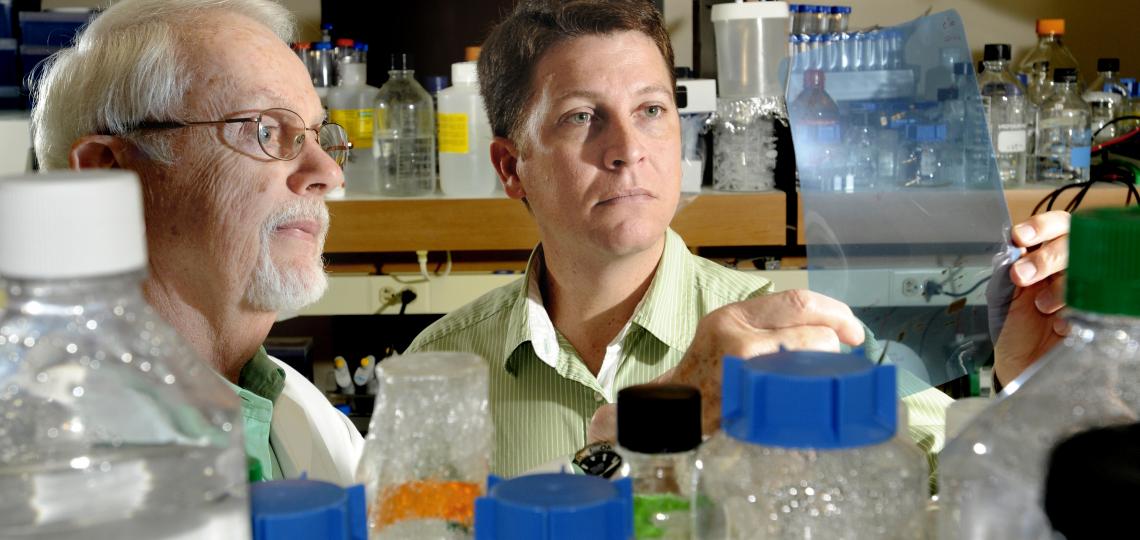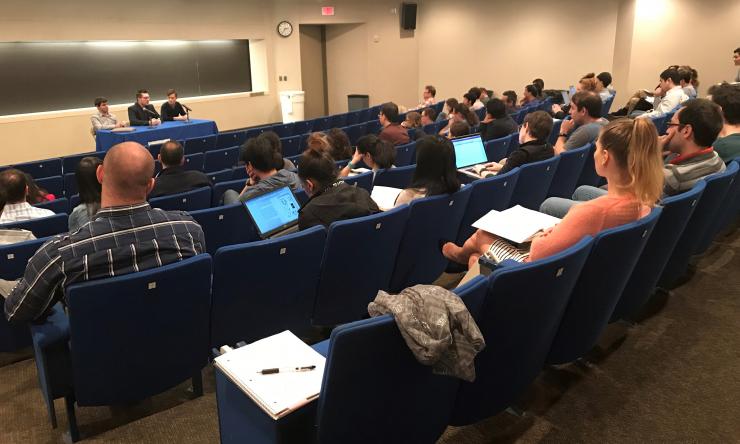Becoming a scientist is more than just getting a Ph.D. degree--it means learning how to combine a unique way to think about biological problems with knowledge of cutting-edge technology. But what constitutes the best training for you depends on your individual needs. We will help you match your background and goals with your education as you select from among a wide array of courses.
A wide range of courses are available to you during your first year. Small class size facilitates one-on-one interactions with some of the nation’s leading scientists. You will acquire depth and breadth in a number of different areas, combined with a more intensive investigation of topics of particular interest to you.
Your choices for curriculum can be individualized, depending on what you have already had during your undergraduate and/ or master's studies. However, we also want to ensure that you acquire a broad base of knowledge. We achieve this by offering a curriculum that is a mix of required courses, and elective courses.
CCB Research and Success in Graduate School Courses
CCB Research and Success in Graduate School Courses employ an active learning and small team-based learning format for first year CCB students that is taught by CCB program leadership and GSBS program faculty. The intimate format enables the CCB program leadership to get to know students at the beginning of their graduate career, and also encourages close working relationships with fellow first-year CCB and GSBS classmates.
Strategies for Success in Graduate School
The Strategies for Success in Graduate School course will prepare incoming students to become scientific and professional leaders by developing skills for a successful gradate career early in their training. The objectives are to:
- Understand the expectations of a professional lab environment
- Take ownership over your training and graduate career
- Identify your scientific and personal working style and motivations
- Discuss how to evaluate potential mentors and thesis labs
- Learn how to successfully manage the mentor-mentee relationship
- Discuss scientific and personal support services at BCM
- Develop networking skills
Reading and Evaluating the Scientific Literature
The Reading and Evaluating the Scientific Literature course will assist students in developing an understanding of scientific research and foster skills in reading and evaluating the scientific and medical literature. We will discuss the philosophies of scientific inquiry, the scientific methods/approaches, the factors and aspects that contribute to exemplary as opposed to unsatisfying scientific publications. Students will be responsible for critically reading the assigned literature and participate in discussions to evaluate the selected literature as a group and individually.
Scientific Writing
The Scientific Writing course posits that great scientific communicators convey complex ideas to broad audiences clearly and passionately. Indeed, strong scientific communication–writing with clarity and brevity–begins by understanding your audience, where you will learn approaches to communicate with any reader. Then, we dive into the world of words where you will learn how to select precise words that convey your unique ideas. Next, you will learn how to optimize your sentences, and why writing a sentence longer than 30 words is usually a bad idea. Don’t worry, you will also learn how to write short, compelling sentences that highlight your work and persuade readers. We finish with a discussion of how to craft compelling paragraphs that logically link together for a seamless reading experience! Throughout this course, you will gain the tools to untangle difficult writing and work through exercises designed to demonstrate how to take your writing to the next level. After completing this course, you will be well on your way to becoming a great scientific communicator!
NRSA Grant Writing & Project Development I & II
The NRSA Grant Writing & Project Development I & II courses objectives are to:
- Identify and evaluate the primary scientific literature and interpret the results
- Evaluate and identify critical problems, identify significance and innovative approaches
- Develop and justify the scientific rationale, testable hypotheses, design rigorous and reproducible experimental approaches to test leading hypotheses using multiple and independent predictions
- Develop specific aims and grant proposals
- Develop scientific writing skills
- Conceptualize, plan, write, and orally defend a complete NRSA F-type grant proposal
- Develop and give lucid presentations
The goal of the course is to help students develop practical research and intellectual skills, and grant writing acumen very early in their graduate studies, as the result of direct interaction with and guidance from a group of highly experienced and successful scientists.
Research Rotations
Research rotations are designed to allow you to sample three to five different laboratories before you chose your mentor. Two months of performing experiments and getting to know the members of the lab provides you with the information you need for choosing a thesis lab. Rotations also provide a valuable education as you learn a variety of skills and techniques, experience different intellectual environments, and meet grad students and postdocs in different labs around the Baylor College of Medicine campus.
How do you find the information you need about what labs to choose for rotations? You will have the opportunity to hear faculty members present a brief overview of their research. These short talks, along with information that each faculty member has on this website, provide insight about specific research programs.
Many of the program's faculty also teach courses. Listening to someone teaching in their area of expertise really gives you an idea of how that person approaches science and thinks about problems.
Finally, our students are a cohesive and interactive group, which means that the more senior students are in close contact with the more junior students. Senior students provide informal advice about labs (science, mentoring, etc.), help with preparation for the qualifying oral exams, and (in one case) also teach salsa dance lessons.
Seminar Course
The Student Research Seminar course meets every Monday afternoon, for a formal hour-long seminar presented by a student (two 2nd-to 4th-year students present a 30-minute seminar during each session). The question-and-answer period at the conclusion of the formal presentation usually lasts 5 to 10 minutes, with students asking questions that display an amazing degree of intellectual rigor and analysis.
As a result of this course, you will develop seminar skills that rival those of any Ph.D. student in the U.S. More importantly than seminar presentation skills, however, is that you will have the opportunity for dialogue and exchange really brings the inter-disciplinary goals of the program to fruition. You will clearly follow the research progress of your peers, paying attention to evolving models and developing technologies.
Career Development
The BCM Career Development Center offers many workshops and seminars as well as one-to-one counseling and other services to help plan for your future career from your first days of graduate school through graduation day and beyond.
Student Success Resources
Student success resources at BCM are designed to help you navigate through your education and into the workforce. Taking care of yourself is a pre-requisite to your success in school and beyond. At BCM you will have many options to participate in individualized or group wellness programs, as well as access to support services including the Student Disability Services, Ombuds Office, and more.











